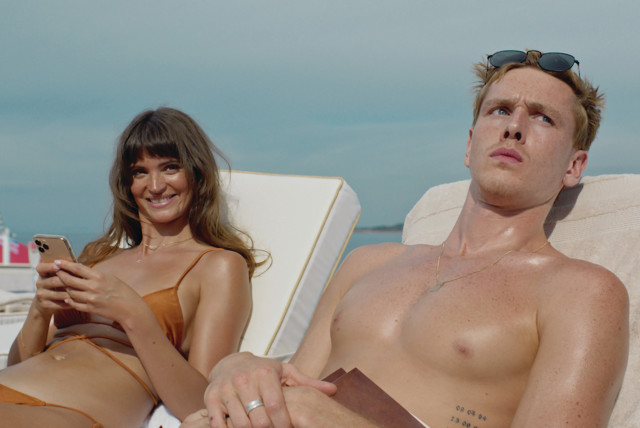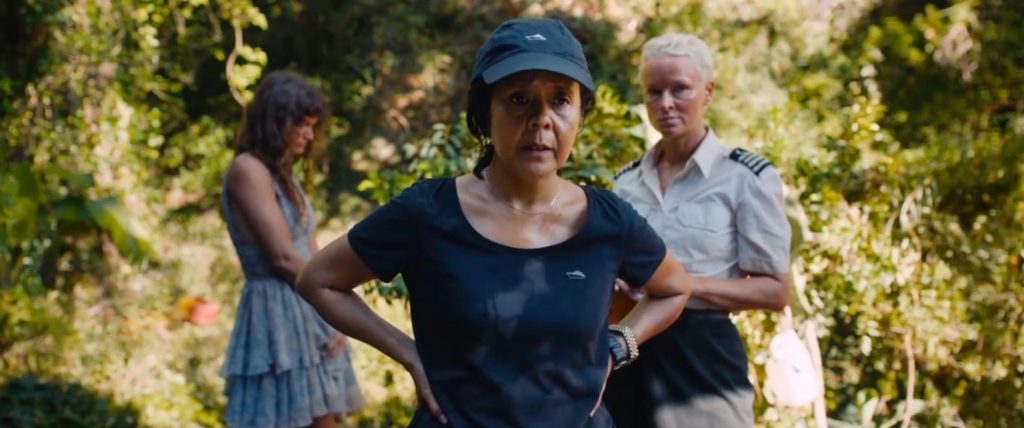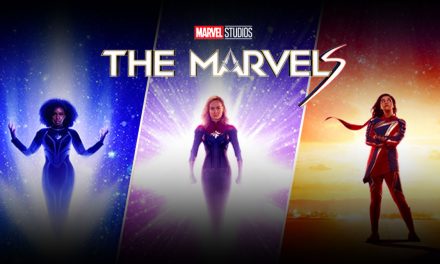In Triangle of Sadness, celebrity model couple Carl (Harris Dickinson) and Yaya (Charlbi Dean) are invited on a luxury cruise for the uber-rich, helmed by an unhinged boat captain (Woody Harrelson). But what first appeared instagrammable ends catastrophically, leaving the survivors stranded on a desert island and fighting for survival.
The film comes from writer/director Ruben Östlund, and won the Palme d’Or at Cannes earlier this year.
What’s a “triangle of sadness”?
If you’re outside the modeling / plastic surgery industry, you may not be familiar with the term “triangle of sadness.” The movie explains the concept early on, when Dickinson’s Carl is asked to “relax his triangle of sadness” at a modeling casting call. (It’s the wrinkle between someone’s eyebrows.)
Östlund himself said, “In Swedish it’s called ‘trouble wrinkle’ and it suggests you’ve had a lot of struggles in your life. I thought it said something about our era’s obsession with looks and that inner wellbeing is, in some respects, secondary.”
As you might anticipate, status, vanity, and overall “looks” play into the film’s themes pretty significantly. It’s a subset of the movie’s larger thesis, which is…
Rich people are the worst.
The uber-wealthy are a different (generally more terrible) kind of people. You know it. I know it. Östlund knows it – and he’s going to make sure that’s present in every moment of this film.
From the first time Carl and Yaya step on board the luxury yacht, we see them surrounded by people who are comically wealthy and out of touch. Yaya poses for photos with food she can’t eat. A couple lament their business’s decline in revenue due to greater restrictions on war crimes. A man tries to buy a Rolex for a woman he just met at the bar.

And the service on the yacht only encourages their behavior. An early scene sees Vicki Berlin’s Paula instructing the crew to never turn down a guest request – no matter what it is. “No” is simply not an option when speaking to people this rich. (This ultimately leads to the entire crew having to abandon their posts because one guest gets it in her head that they should all “have fun” going down the ship’s water slide.)
Naturally, then, it’s deeply satisfying to watch these hoity-toity vacationers all get violently ill during a rough night on the water. (Food poisoning meets seasickness – the great equalizer.) If you’ve seen the film’s trailer, you know Östlund isn’t afraid to let things take a turn for the gross. It’s an…explosive sequence.
Violent illness, a stormy night, and an attack by pirates ultimately leads the yacht to capsize. Most of its passengers wind up missing or dead, but a few find themselves washed ashore on a desert island. Now, it’s a survival story – with people who seemed barely fit to function in the most plush and luxurious of conditions.
A lot of satire, but not a lot of subtlety
Fortunately for the washed-up wealthy, an unintended savior arrives via lifeboat shortly after. Abigail (Dolly De Leon), a member of the below-decks crew, comes bearing bottled water and pretzel sticks. To no one’s surprise, it also seems she’s the only one who has any hope of catching fish and building a fire to keep everyone alive. After a day of doing the work to keep everyone alive, Abigail claims the well-deserved role of “captain” of the survivors and starts calling the shots on their little island. (It turns out you can’t survive off Rolexes alone. Who could have guessed?)

The acting in Triangle of Sadness is strong, and you do find yourself invested in the characters. (Whether you’re rooting for them or against them.) That said, it’s not a subtle film. The class commentary can lead to laughs, sure. But it feels like a very surface-level critique of its subject matter, and one that acts like it needs to carefully spell out every “revelation” for the audience.
Triangle of Sadness is also certainly longer than it needs to be. We spend quite a bit of time watching Carl and Yaya’s relationship before they board the yacht, and that introduction could have been reduced significantly. (Or indeed, cut entirely. I think their actions on the yacht alone would have explained their dynamic to the audience just fine. But again, this is the kind of film that really spells everything out for you.)
Overall, Triangle of Sadness could have presented a more subtle and nuanced takedown of wealth and classism, but it’s still a pretty watchable film with solid laughs throughout.

![Triangle of Sadness: A Not-So-Subtle Takedown of Wealth & Class [Review]](https://thathashtagshow.com/wp-content/uploads/2022/10/project_20221004_1539334-01-1200x640.png)
![Cobra Kai Season 5 Will Give The Valley A Season To Remember [Non-Spoiler Review]](https://thathashtagshow.com/wp-content/uploads/2022/09/cobra-kai-review-440x264.png)


